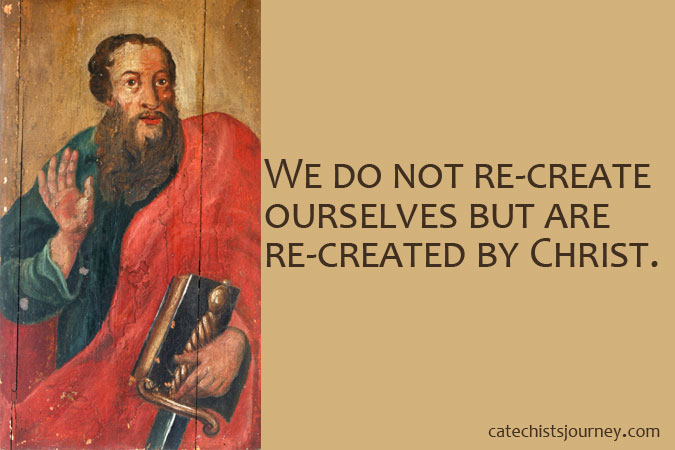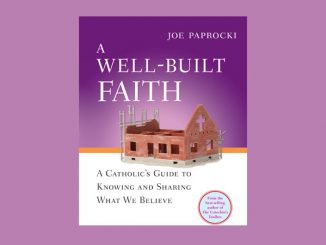
You may hear parents or others in your faith community talk about catechesis like it’s a self-improvement course. While following Jesus and growing closer to God will hopefully improve our lives, the goal is not self-improvement. The entire message of Salvation through Jesus Christ is that we are incapable of saving ourselves and are in need of a divine intervention, which means a renouncing of the self. Our destiny is not to become a better version of ourselves but rather to reflect the “imago dei” (image of God) (CCC #1877). This does not mean that we become equal to God but that we come to have a share in the Divine Life.
St. Paul famously wrote, “It is no longer I who live, but it is Christ who lives in me.” (Galatians 2:20) He did not say, “Now I have become the best version of myself!” Paul also wrote, “If anyone is in Christ, there is a new creation.” (2 Corinthians 5:17) We do not re-create ourselves but are re-created by Christ. Repentance, or metanoia, is transformation of the person in the image of Christ—not an improvement of the self, which only serves to elevate the ego. Notice that spiritual practices begin with renunciation of the self by way of prayer, fasting, and almsgiving. Bishop Robert Barron reminds us that we are invited to enter into the “Theo-drama,” the great story being told by God, while leaving behind the “ego-drama,” the “self-centered play we attempt to write, produce, direct, and star in ourselves.”
How we speak to people, beginning with children, of our Salvation and the reality of grace is critically important. Look at the following examples of carefully crafted language in God’s Gift: Reconciliation that invites children, not to improve themselves, but to recognize God’s initiative and invitation to share in the Divine Life:
- “God promised that he would send a Savior. Our Savior, Jesus, would free us from Original Sin. He would show us how to become closer friends with God. He would reconcile us with God.”
- “Jesus suffered and died, rose from the dead, and ascended into heaven to save us from sin. He offered his life so that we could be reconciled with God our Father. He offered his life because he loves us.”
- “In the Sacrament of Reconciliation, Jesus comforts us. He strengthens us on our journey. We are reconciled with God, with the Church, and we seek to be reconciled with the people we have hurt.”
When I speak at parent meetings for First Communion or First Reconciliation preparation, I often remind parents: “Your child’s First Holy Communion (or Reconciliation) is not about him or her. It is about what God is doing in the life of your child. God does all the work. Your job is to help your child understand what it means to receive and how to receive.”
In my book, Under the Influence of Jesus, I wrote:
If you located this book in the “Self-Help” section of a bookstore, you should immediately find the store manager and complain, because this book is the opposite of a self-help book. In fact, the very essence of Christianity is the antithesis of self-help: we gain access to the kingdom of God not through our own efforts, but through the Person of Jesus Christ. This is a book about dependency. Healthy dependency. Original sin is the mistaken notion that we can have perfect health and perfect vision without God—that we can save ourselves. Discipleship, on the other hand, is a way of life that embraces our basic blindness and imperfection and our need to be saved by Jesus Christ.
Let’s stop trying to improve ourselves by our own power and let God re-create us!




I am not that all spiritually advanced but my experience is that it is a paradox.
1) God does it ALL. I really think that is true in my life
2) I have to make time for God in reading/study, prayer/contemplation, do an assessment of my life and how I am doing in action…loving….forgiving…working to be better.
It involves self help and God…and is a paradox.
That seems to be my experience at this point in life anyway.